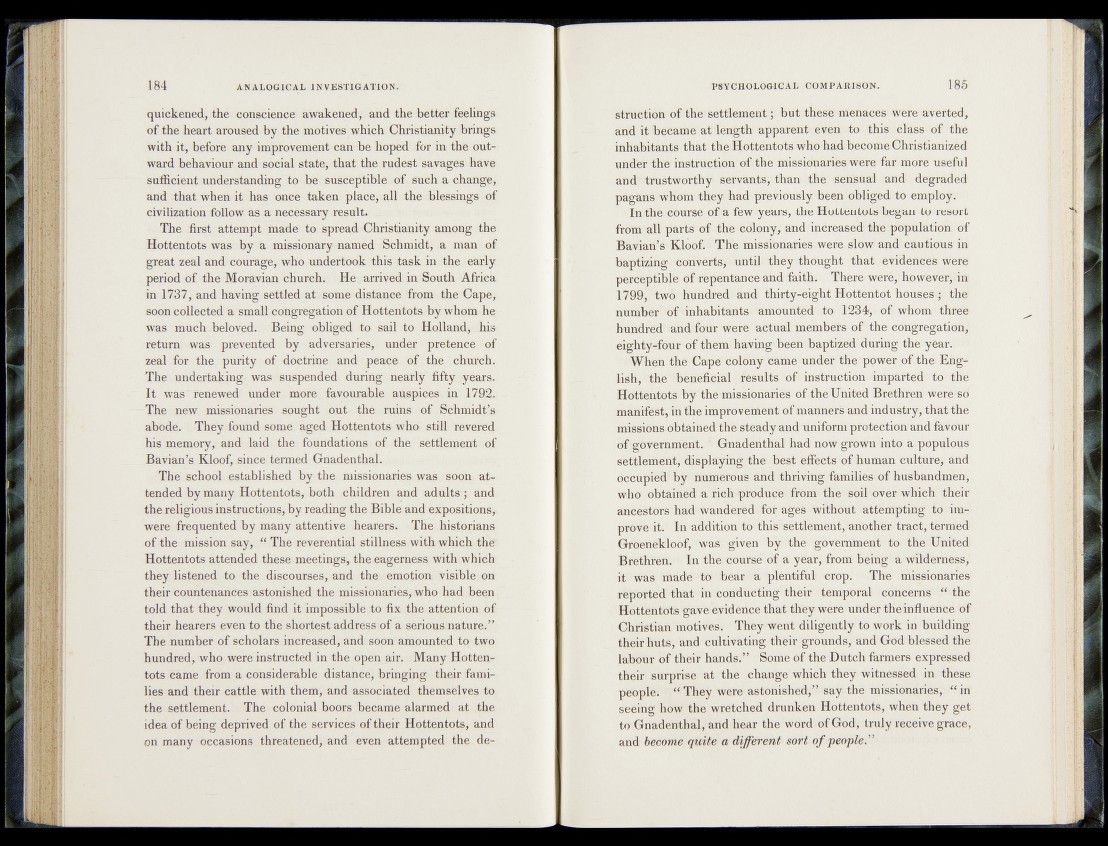
quickened, the conscience awakened, and the better feelings
of the heart aroused by the motives which Christianity brings
with it, before any improvement can be hoped for in the outward
behaviour and social state, that the rudest savages have
sufficient understanding to be susceptible of such a change,
and that when it has once taken , place* all the blessings of
civilization follow as a necessary result. ....
The first attempt made to spread Christianity among the
Hottentots was by a missionary named Schmidt, a man of
great zeal and courage, who undertook this task in the early
period of the Moravian church. He arrived in South Africa
in 1737, and having settled at some distance from the Cape,
soon collected a small congregation of Hottentots by whom he
was much .beloved. Being obliged to sail to Holland, his
return was prevented by adversaries, under pretence of
zeal -for the purity of doctrine and 'peace of the church.
The undertaking- was suspended during nearly^ fifty years.
I t was'Tenewed under, more . favourable auspices in 1792.
The new missionaries sought out- the ruins of Schmidt’s
abode. They found some aged Hottentots who still revered
his memory, and laid, the foundations, of the settlement of
Bavian’s Kloof, since termed Gnadenthal.
The school established by the missionaries was soon attended
by many Hottentots, both children and adults ; and
the religious instructions, by reading the Bible and expositions,
were frequented by many attentive hearers. The historians
of the mission .say, “ The reverential stillness with which the
Hottentots attended these meetings, the eagerness with which
they listened to the discourses, and the emotion, visible on
their countenances astonished the missionaries, who had been
told that they would find it impossible to fix the attention of
their hearers even to the shortest address of a serious nature.”
The number of scholars increased, and soon amounted to two
hundred, who= were instructed in the open air. Many Hottentots
came from a considerable distance, bringing their families
and their cattle with them, and associated themselves to
the settlement. The colonial boors became alarmed at the
idea of being deprived of the services of their Hottentots, and
on many occasions threatened, and even attempted the destruction
of the settlement; but these menaces were averted,
and it became at length apparent: even to this class of the
inhabitants that-the Hottentot’s who had become Christianized
under the instruction of the missionaries were far more useful
and trustworthy servantsy than the sensual and degraded
pagans whom they had previously been obliged; to employ. ;
In the course of-a few years, the Hottentots began to resort
from all parts of the colony, and increased the population of
Bavian’s Kloof. The missionaries were slow and cautious in
baptizing converts, until they thought that evidences were
perceptible of repentance and faith. There were,’ however, in
1799* two hundred, and thirty-eight Hottentot houses-; the
number of inhabitants amounted* to .1234, of whom three
hundred and four were actual members of' the congregation,
eighty-four of them having been baptized during the year;
When the Cape colony came under the power of the English*
the. beneficial results of instruction-imparted to the
Hottentots by the’missionaries of the United Brethren were so’
manifest, in the improvement of manners and industry, that the
missions obtained the steady and uniform protection and favour
of*gtrvernment. ' Gnadenthal had now grown into a populous
settlement, displaying the best effects of human culture,: and
occupied'by numerous and thriving families of husbandmen,
who . obtained a rich-produce'* from the soil over which their
ancestors had wandered for ages without attempting to improve‘
it. In addition to this settlement, another tract, termed
Groenekloof, was given by the government to the United
Brethren. In the course of a year, from being a wilderness,
it' was made - to bear a plentiful crop. The missionaries
reported that in conducting their temporal concerns “ the
Hottentots gave evidence that they were under theinfluence of
Christian motives. They went diligently to work in building
their huts, and cultivating their grounds, and God blessed the
labour of their hands.” Some of the Dutch farmers expressed
their surprise at the change which they witnessed in these
people. “ They were astonished,” say the missionaries, “ in
seeing how the wretched drunken Hottentots, when they get
to Gnadenthal, and hear the word of God, truly receive grace,
and become quite a different sort o f people.”